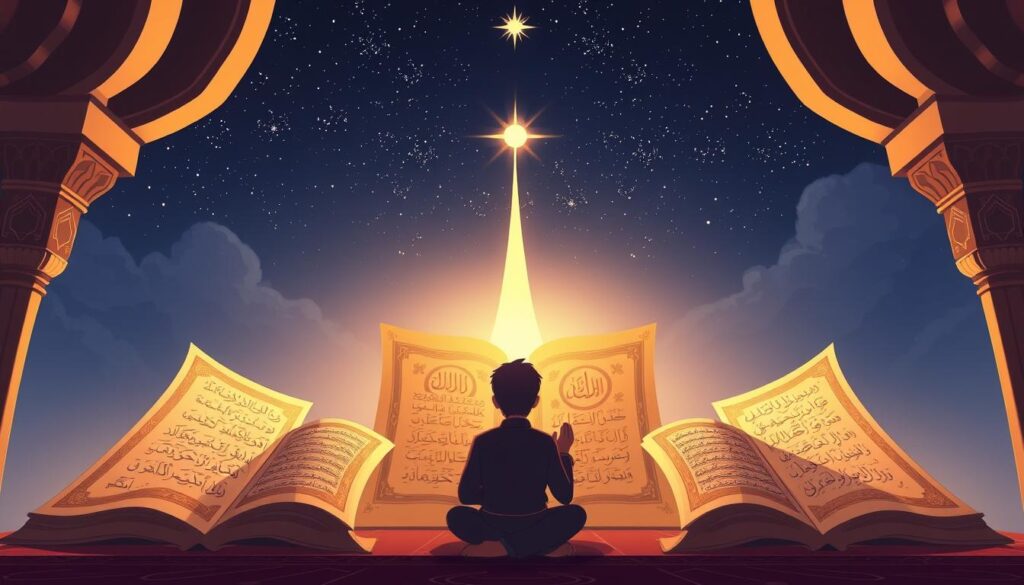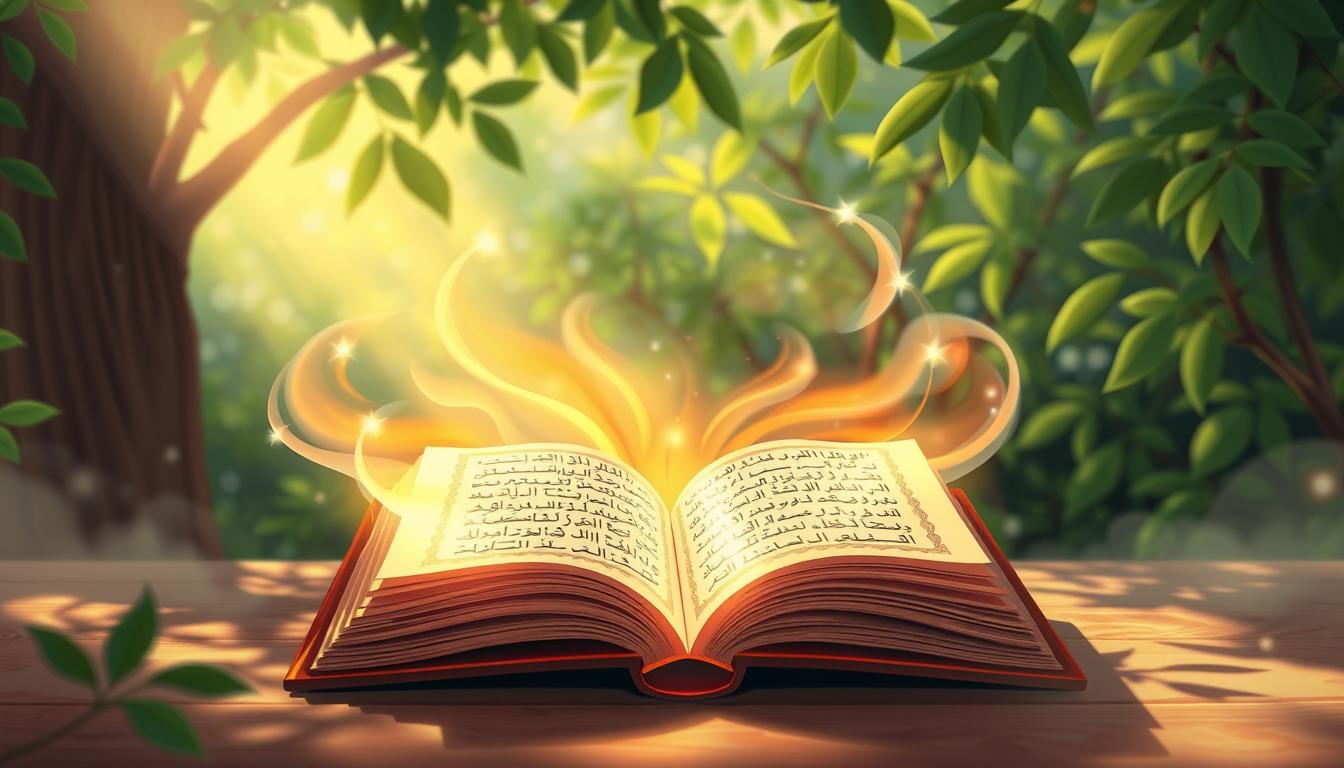For over 1400 years, the du’as from Prophet Muhammad (PBUH) have been kept safe. They offer us a wealth of spiritual advice. The most common du’a is “O Changer of the hearts,” showing a need for stability and steadfastness.
We aim to give a full guide to duas in Hadith. We’ll show their importance and how they can improve our daily lives. We’ll also look at different Hadith duas to strengthen our bond with Allah.
Exploring authentic duas in Hadith, we see the Prophet Muhammad (PBUH) valued supplications. He said, “Duas are the weapon of a believer.” This shows how duas in Hadith can change our lives and bring us closer to Allah.
By understanding Hadith duas and using them daily, we can see positive changes and grow spiritually.
Key Takeaways
- We can learn from the preserved du’as and supplications of Prophet Muhammad (PBUH) to guide us in our spiritual journey.
- Duas in Hadith provide a powerful tool for seeking stability, steadfastness, and spiritual fulfillment.
- The Prophet’s teachings emphasize the importance of love, community, and interpersonal harmony in our supplications.
- By exploring Hadith duas, we can gain a deeper understanding of the hierarchy of needs in spiritual supplication and the significance of Allah’s love in our lives.
- Authentic duas in Hadith offer a wealth of knowledge and wisdom that can help us navigate life’s challenges and achieve balance between our worldly and spiritual lives.
- Through the practice of duas in Hadith, we can cultivate personal character development, moral integrity, and a stronger connection with Allah.
- The diversity of expressions in Hadith demonstrates the flexibility and adaptability of duas in Hadith to meet our unique needs and circumstances.
Introduction to Duas in Hadith
We believe that understanding duas in Hadith is key to connecting with Allah. The Quran says, “Call upon Me, I will respond to you” (Quran 40:60). This shows how important supplications are in Islam. Through Hadith supplications, we learn from Prophet Muhammad (PBUH) and other prophets. Their duas guide us in our daily lives.
By adding Hadith prayers to our routine, we seek Allah’s guidance and mercy. Prophet Muhammad (PBUH) showed us the value of prayer. We aim to encourage our readers to include duas from Prophet Muhammad in their daily practice. This can strengthen our bond with Allah and enrich our lives.
Importance of Supplications in Islam
Supplications are a core part of Islamic worship, showing a Muslim’s devotion to Allah. The Quran shares examples of Prophet duas, stressing their role in faith. We can apply the teachings of the prophets to our lives, using Hadith supplications as a guide.
The Role of Prophet Muhammad (PBUH) in Teaching Duas
The Prophet Muhammad (PBUH) was key in teaching duas, giving us valuable knowledge and inspiration. His duas serve as a model for us. By studying Hadith prayers and duas from Prophet Muhammad, we can deepen our understanding of Islam and grow in faith.
Some key benefits of using Hadith supplications in our daily lives include:
- Seeking Allah’s guidance and protection
- Deepening our connection with Allah
- Cultivating a stronger faith
- Learning from the prophets’ experiences and teachings
By embracing duas from Prophet Muhammad and Hadith prayers, we can change our lives. We seek a more fulfilling and meaningful relationship with Allah.
Key Hadiths Highlighting Duas
We aim to give you a wide range of authentic Hadiths about duas. These show their importance and benefits. The Prophet Muhammad (PBUH) said, “The supplication of a servant is granted as long as he does not ask for sin or the cutting off of ties of kinship” (Muslim). This teaches us to make duas with good intentions and a pure heart.
Understanding Authentic Hadiths
It’s key to understand authentic Hadiths to grasp the value of duas. We learn from the Hadith collection of prayers and Prophetic duas. They guide us on how to make effective supplications. For instance, the Prophet Muhammad (PBUH) taught us to begin our duas with praise and gratitude, using phrases like “Alhamdulillah” and “Subhanallah”.
Notable Sources of Hadith
Important sources of Hadith, like the Quran and the sayings of the Prophet Muhammad (PBUH), offer valuable insights. The Quran teaches us to be humble in our supplications, saying “Call upon your Lord in humility and privately; He does not like transgressors” (Quran 7:55). By studying these sources, we can understand the significance of duas in our lives.
Some notable Hadith references for duas include:
- Hadith from At-Tirmidhi: “The best remembrance in Islam is ‘La ilaha illallah'”.
- Hadith from Al-Bukhari and Muslim: “The dua for asking the best in this life and the hereafter is found in Al-Bukhari and Muslim”.
- Hadith from Abu Dawud and At-Tirmidhi: “The dua for protection, recited three times in the morning and evening, is asserted to provide safety from harm”.

Common Duas for Daily Life
We think adding Duas from Hadith to our daily routine helps us connect with Allah. The Prophet Muhammad (PBUH) said, “The supplication of the servant is granted between the adhan and the iqamah” (Tirmidhi). This shows how important it is to include these prayers in our daily lives.
Some common Duas include morning and evening prayers, as well as ones for meals and gratitude. These prayers help us feel closer to Allah and ask for His mercy and blessings. For instance, the morning Dua is “Allahumma bika asbahna wa bika amsayna”, which means “O Allah, we enter the morning and evening with Your name”.
Here are some key benefits of adding these Duas to our daily routine:
- Protection from negative influences such as the evil eye, anxiety, and grief
- Guaranteed fulfillment of Dua by Allah, unless it is related to sin or breaking relations
- Importance of intercession, with a direct association stating that failure to invoke Allah results in entry to Hellfire
By making these Duas from Prophet Muhammad a part of our daily lives, we can seek Allah’s guidance and protection. We hope to inspire our readers to add these Duas to their daily routine. This can bring positive change to their lives.
| Dua | Time | Benefits |
|---|---|---|
| Morning Dua | Morning | Protection from negative influences |
| Evening Dua | Evening | Guaranteed fulfillment of Dua by Allah |
| Dua for meals | Before and after meals | Gratitude and appreciation for Allah’s blessings |
Special Duas for Seeking Forgiveness
We believe seeking forgiveness is key to our spiritual growth. Through Hadith prayers and Prophetic duas, we connect deeply with Allah. The Prophet Muhammad (PBUH) taught us the value of seeking forgiveness. He said Allah forgives us as long as our soul is in our body (Tirmidhi).
Some important Hadith references for duas include “astaghfirullah.” Reciting it 100 times a day can help us face challenges. The Prophet Muhammad (PBUH) asked for forgiveness over 70 times a day (Sahih al-Bukhari 6307). We can follow these examples in our daily lives.
The Importance of Repentance
Repentance is vital when seeking forgiveness. By admitting our wrongs and showing regret, we can find Allah’s mercy. The Quran tells us Allah won’t punish us while we’re asking for forgiveness (Quran 8:33). This promise gives us hope and encourages us to make amends.
Specific Hadiths on Forgiveness
There are many Hadiths that guide us on seeking forgiveness. For instance, Abu Hurairah said the Prophet (saas) asked for forgiveness 100 times a day (Sunan Ibn Majah 3815). We can make seeking forgiveness a daily habit.
| Dua | Benefits |
|---|---|
| Astaghfirullah | Overcome marriage difficulties, health issues, financial problems |
| Subhan Allahi wa bihamdihi | Forgiveness of all sins, even if numerous as the foam of the sea |
Duas for Health and Well-being
We believe in the power of Duas to bring comfort, healing, and protection. Duas from Prophet Muhammad offer deep solace and strength. They cover various aspects of our well-being, from physical health to emotional healing.
The dua for good health is a powerful supplication. It asks for well-being in physical health, hearing, and sight. We suggest reciting it three times in the morning and evening to seek Allah’s protection and guidance.
Also, the Hadith recorded by Sahih al-Bukhari shows the Prophet’s method. He treated afflicted individuals by placing his right hand on the affected area. He repeated a specific dua for relief from pain.

- Seeking Allah’s guidance and protection from harm
- Finding comfort and solace in times of illness or distress
- Strengthening one’s faith and connection with Allah
We hope exploring Duas from Prophet Muhammad will deepen our well-being and spiritual growth. By incorporating them into our daily lives, we can find a deeper connection with Allah.
Duas for Guidance and Wisdom
We often face situations where we need guidance and wisdom. In these times, we can turn to Hadith references for duas and Prophetic duas. These help us seek Allah’s direction and mercy.
Seeking guidance requires a sincere heart and intention. Ibn al-Qayyim says knowledge is light for our hearts. But, being far from Allah can block this light. We can use certain supplications to seek guidance and wisdom:
- ٱهْدِنَا ٱلصِّرَٰطَ ٱلْمُسْتَقِيمَ (Guide us to the straight path)
- رَّبِّ أَدْخِلْنِي مُدْخَلَ صِدْقٍ وَأَخْرِجْنِي مُخْرَجَ صِدْقٍ (Let me enter with a truthful entrance and exit with a truthful exit)
- رَبَّنَا آمَنَّا فَاكْتُبْنَا مَعَ الشَّاهِدِينَ (We believe, so write us among the witnesses)
These Prophetic duas and Hadith collection of prayers help us connect with Allah. They seek His mercy and blessings. By using these supplications daily, we can find guidance and wisdom.
Remember, seeking guidance and wisdom is ongoing. It needs patience, sincerity, and dedication. By turning to Allah and using these supplications, we can find the direction and clarity we need. This helps us make informed decisions and live a righteous life.
Duas for Protection
We believe in the power of Duas in Hadith to protect us every day. When we face challenges, we turn to Hadith supplications for help. The Prophet Muhammad (PBUH) showed us how important it is to seek Allah’s protection.
Some key Duas for protection include “I seek refuge in Allah from the accursed devil.” We also recite Surah Al-Ikhlas, Surah Al-Falaq, and Surah An-Nas. These Duas were recommended by the Prophet (PBUH) to keep us safe from harm.
We can say these Duas every day, after our five daily prayers. This way, we ask Allah for mercy and blessings.
At night, reciting the last two verses of Sūrat al-Baqarah can protect us. The Prophet (PBUH) said these verses keep devils away for three nights. We can also use the Tawaud, Quls, and Ayat al-Kursi for family protection.

By adding these Duas to our daily routine, we ask Allah for protection. We can also recite them during witr prayer for well-being and protection. Remember, these supplications are key for a believer’s trust in Allah’s help every day.
- Recite the phrase “I seek refuge in Allah from the accursed devil” daily
- Recite Surah Al-Ikhlas, Surah Al-Falaq, and Surah An-Nas for protection from evil
- Recite the last two verses of Sūrat al-Baqarah at night for protection from devils
- Recite the Tawaud, Quls, and Ayat al-Kursi as a minimum for family protection
By following these guidelines and reciting these Duas, we seek Allah’s protection. May Allah guide and protect us from harm.
Duas During Times of Distress
Life can be tough, and we often need comfort. The Prophet Muhammad (PBUH) showed us the value of Hadith prayers and Hadith references for duas. He taught us to say “O Allah, I am Your slave” when we’re feeling down.
Islamic teachings tell us about powerful duas for hard times. Some include:
- “There is no god but Allah, the All-Great, the Patient”
- “Sufficient for me is Allah” (recited seven times in the morning or evening)
- “O Ever-Living, O Self-Sustaining”
These Prophetic duas remind us of Allah’s kindness and strength. They help us stay strong when things get tough. By saying these duas, we find comfort and trust Allah to guide us.
When facing life’s hurdles, let’s turn to Allah for help. May our Hadith prayers and Hadith references for duas give us strength. And may we always trust in Allah’s wisdom and power.
| Dua | Benefits |
|---|---|
| “O Allah, I am Your slave” | Emphasizes submission to Allah’s will |
| “There is no god but Allah, the All-Great, the Patient” | Reminds us of Allah’s mercy and power |
| “Sufficient for me is Allah” (recited seven times in the morning or evening) | Fulfills desires both worldly and hereafter |
Group Duas and Their Significance
We think group duas are a strong way to ask for Allah’s help and protection. The Prophet Muhammad (PBUH) said, “The supplication of the group is granted, as long as they do not ask for sin or the cutting off of ties of kinship” (Muslim). This shows how important it is to pray together in Islam.
Group duas bring many benefits, including:
- Amplifying the voices of believers, increasing the likelihood of prayers being answered
- Providing a sense of community and shared responsibility
- Allowing individuals to learn from one another and grow in their faith
Some notable Hadiths on group duas include:
“Allah’s hand (blessings) is with the group” (Jami Tirmidhi, Hadith 2166)
This highlights the importance of praying together. By joining group duas, we can get closer to Allah and ask for His mercy and blessings.

| Benefit | Description |
|---|---|
| Collective Prayer | Amplifies the voices of believers, increasing the likelihood of prayers being answered |
| Community Building | Provides a sense of community and shared responsibility |
| Spiritual Growth | Allows individuals to learn from one another and grow in their faith |
Understanding group duas helps us connect more with Allah. We hope to encourage our readers to join group duas. Using Duas from Prophet Muhammad and Hadith supplications can deepen their faith and seek Allah’s mercy and blessings.
The Art of Making Duas
Making duas is a key part of our spiritual journey. It’s important to know how to make effective prayers. The Prophet Muhammad (PBUH) said, “Du’a is worship itself.” This shows how important prayer is in Islam.
To make our prayers stronger, we should say them out loud. This is what the Qur’an, 17:110, teaches. We should also start by praising Allah (SWT), as Jami at-Tirmidhi tells us.
Here are some tips for making good duas:
* Say prayers for the Prophet (SAW) before you pray
* Use Allah’s ninety-nine names in your prayers
* Pray for others, as Sahih Muslim advises
* Pray often, even when things are easy, as Jami at-Tirmidhi suggests
We can find Hadith references for duas and Prophetic duas in many Hadith collections. These help us learn how to pray correctly.
By following these tips and understanding the value of Hadith collection of prayers, we can get closer to Allah. We should be patient when waiting for answers to our prayers. Also, avoid sin and keep family ties to make sure our prayers are accepted.
The Impact of Duas on One’s Life
We believe that Duas in Hadith can change our lives. By adding Hadith supplications to our daily routine, we can see the deep effect of Duas from Prophet Muhammad. This can improve our well-being and spiritual growth.
Transformative Power of Supplications
The power of supplications is clear in many Muslims’ lives. They have seen the good effects of Duas in Hadith. These effects include:
- Increased sense of peace and tranquility
- Improved relationships with others
- Greater sense of purpose and direction
Personal Stories of Fulfilled Duas
There are many stories of Duas from Prophet Muhammad being answered. For example, the Prophet Muhammad (PBUH) said, “The supplication of the servant is granted as long as he does not ask for sin or the cutting off of ties of kinship” (Muslim). This shows how important it is to make Duas in Hadith with true sincerity and pure intention.

Understanding the Hadith on Praying for the Dead
The Hadith on praying for the dead is a significant teaching in Islam. It emphasizes the importance of intercession and the power of prayer for the deceased. This belief is rooted in the teachings of the Prophet Muhammad (peace be upon him) and is supported by various Hadith references.
According to the Hadith, praying for the dead is a righteous act that can benefit the deceased. It is believed that the prayers of the living can help alleviate the suffering of the deceased and bring them closer to Allah. This practice is seen as a way to show compassion and care for those who have passed away.
One of the key Hadith references for this belief is found in Sahih Bukhari, a collection of authentic Hadiths compiled by Imam Bukhari. In this Hadith, the Prophet Muhammad (peace be upon him) is reported to have said, “When a person dies, all his good deeds come to an end except three: ongoing charity, knowledge from which others benefit, and righteous children who pray for him.” This Hadith highlights the significance of praying for the dead and the impact it can have on their well-being in the afterlife.
Another important Hadith reference is found in Sahih Muslim, another reliable collection of Hadiths. In this Hadith, the Prophet Muhammad (peace be upon him) is reported to have said, “When a person dies, his deeds come to an end except for three: ongoing charity, knowledge from which others benefit, and righteous children who pray for him.” This Hadith further emphasizes the importance of praying for the dead and the positive impact it can have on their spiritual journey.
These Hadith references provide valuable insights into the significance of praying for the dead in Islam. They highlight the power of intercession and the impact that our prayers can have on the well-being of those who have passed away. By praying for the dead, we demonstrate our compassion, care, and commitment to their spiritual journey.
Praying for the Dead: A Righteous Act
Praying for the dead is considered a righteous act in Islam. It is a way to show compassion and care for those who have passed away. By praying for the deceased, we demonstrate our love and concern for their well-being in the afterlife.
Praying for the dead is not only a way to honor and remember the deceased but also to seek their intercession. It is believed that the prayers of the living can help alleviate the suffering of the deceased and bring them closer to Allah. This practice is seen as a way to strengthen the bond between the living and the deceased.
Praying for the dead is a beautiful way to show our love and concern for those who have passed away. It is a way to express our gratitude for their presence in our lives and to seek their intercession in our own spiritual journey. By praying for the dead, we demonstrate our commitment to their well-being and our desire to be reunited with them in the afterlife.






